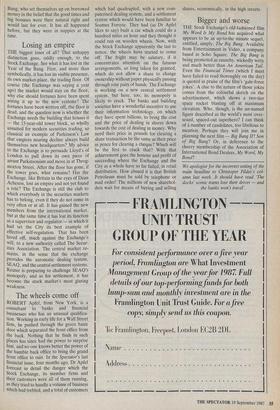Losing an empire
THE biggest loser of all? That unhappy distinction goes, oddly enough, to the Stock Exchange. See what it has lost in the Year of the Bang. First, and more than symbolically, it has lost its visible presence, its own market-place, the trading floor. Of course (the Exchange was saying a year ago) the market would stay on the floor, why else should fortunes have been spent wiring it up to the new systems? The fortunes have been written off, the floor is dead, and the question now is whether the Exchange needs the building that houses it — the 15-year-old tower block, so wholly unsuited for modern securities trading, so classical an example of Parkinson's Law that empires nearing decline always build themselves new headquarters? My advice to the Exchange is to persuade Lloyd's of London to pull down its own piece of arrant Parkinsonism and move in at Throg- morton Street. After the floor has gone, if the tower goes, what remains? Has the Exchange, like Britain in the eyes of Dean Acheson, lost an empire and not yet found a role? The Exchange is still the club to which everybody in the securities markets has to belong, even if they do not come in very often or at all. It has gained the new members from the international market, but at the same time it has lost its function as a supervisor and regulator — in which it had set the City its best example of effective self-regulation. That has been hived off, much against the Exchange's will, to a new authority called The Secur- ities Association. The central market re- mains, in the sense that the exchange provides the automatic dealing system, SEAQ, and the central settlement systems. Reuter is preparing to challenge SEAQ's monopoly, and as for settlement, it has become the stock market's most glaring weakness.


































































 Previous page
Previous page